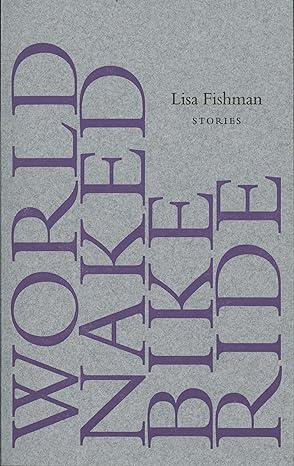
Who can resist the title of this debut short fiction collection? Like cyclists in the eponymous event — a protest against fossil fuel consumption, among other things — Lisa Fishman’s 40 pieces, a collage of micro, flash fiction and narratives of greater length, flout convention. Vanity of vanities, the Pushcart Prize-nominated poet seems to say of the standard short story and its clothing/trappings.
Author of seven poetry collections, Fishman — who teaches literature at Columbia College Chicago and divides her time between Michigan and Nova Scotia — shapes her pieces alternatively and along lines of inquiry, expressly the purpose of written language. The title narrative, the one-page, two-paragraph “World Naked Bike Ride,” is a stripped-down trapeze act of a piece. Like most of the stories here, its sensual, fairy-tale aura borders on absurdist, the space between words ripe with mystery. Here and elsewhere, the author strikes a dream-like balance between what’s “real” and surreal, known and unknown. As exactly half the story goes,
The World Naked Bike Riders rode around the whole world, staying naked or painted or clothed (any degree of nakedness was permissible) for the duration. When the WNBR came through Andre’s town, he offered Else a lemon ice from his cart. It was snowing. The world went around again. (17)
It’s no stretch to think of the writer generally as a WNBRider, embodied by the recurring persona of Else, who transcends physical bounds to embrace possibility as the essence of story.
Enter the territory of Lydia Davis, Booker Prize-winning author of onesentence stories:
The fish that has been sitting in my stomach all afternoon was so old by the time I cooked and ate it, no wonder I am uncomfortable — an old woman digesting an old fish.” (“Old Woman, Old Fish, can’t and won’t, 2014, 242)
A coincidence, maybe, that Fishman’s “Ardent Means Your Teeth Are Strong” echoes, for example, Davis’s “The Visit to the Dentist?”. Fishman’s “plainspoken narratives” are equally lyrical. Her collection is unified by a similar preoccupation with shape-shifting in a world perhaps better suited to poetry. Yet, her best stories thrive on their poetic brevity, the aspect that ignites their urgency. Regardless, the apparent randomness at play throughout the work conjures a liminal space where life’s ephemera rule, and the boundaries of materiality and time itself dissolve. Boundaries between people and animals, fact and invention, past and present. As with Davis, dark humour rises from the gaps between what’s “real” and perceived, provided and withheld.
The element of time — or timing, fundamental to storytelling — is actualized by the movement of Earth and sun, particularly in “Among the Sunflowers,” in which human bodies become vessels for love, and in “Mean Sun Time in Halifax.” A lengthier piece at five pages, unlike many of its companions it draws on a real-time setting to link recognizable details with fantasy, noting novelist Edna O’Brien’s ability to trust in “sleepwalking and storytelling.” (33)
Forget the conventions of character, plot and structure that drive regular storylines. What emerge here are more authentic, unsettling counterparts, people, situations and revelations that create an unease that supersedes usual dramatic tension. Fishman’s narrators and personae, often so shadowy they defy development via agency and action, acquire flesh by association: their surroundings are literally the words that enliven them. Somehow, the recurring and random individuals that populate the collection become no less convincing than the times and spaces invoked, whether historical or contemporary, actual or concocted.
Amidst the Fellini-esque flux of human interaction, riven with non sequiturs in “A Conversation,” naming is what defines the real. “Space is there because of a name,” muses narrator Bruno. (43). Herein lies Fishman’s pressing concern, one that applies not just to naked rider/writers who craft stories, but to anybody who treasures authenticity: “whether writing makes memory superfluous.” (44). In a world of tweets, text messages and screenshots, how other than through written narrative is experience’s significance processed, preserved? What is memory besides what’s buried in our phones, the digital world the most fleeting of any?
Cynics might wonder, what’s the motivation for writing fiction if stories are purged of the architecture that orders experience to give it meaning. Well, there is a liberating energy in Fishman’s fiercely imaginative flights. The fragile beauty of language itself endures, despite how it can be manipulated. Expression thrives for expression’s sake — and given Gaspereau’s artisanal way of making books, Fishman’s collection as a tactile art object couldn’t be more satisfying, extending the stories’ sensory pleasures.
As with the WNBR itself, their locales are far flung and as disparate as Main-a-Dieu, Cape Breton, and “the world’s healthiest village” in Campania, Italy. “I, Pioppi” transports us there with its seductive details, the bounds between place and its human witness almost dissolving into a rapturous oneness. “It isn’t any person you are wanting, but Earth’s body is these things, apart from your own.” (54).
As with Davis, transmogrification eschews the connective tissues that sustain conventional stories and their arcs. As experimental writing, Fishman’s mightn’t be for everyone, its surfaces disarmingly, at times jarringly, adrift. Yet, negotiating the speculative and the factual, the fragmentary and the invisible, as a whole the collection achieves a powerful, incantatory arc. “A person made of paper is a tree, or a book,” Fishman writes in “You May Wish,” (127) and ultimately places everything in the reader’s court, where interpretation belongs all along. Apropos, the concluding piece, “Ghost Story,” is an afterimage/exegesis of her abbreviated works’ effects. “When she began reading again, she was afraid she had skipped some pages,” notes the narrator (177) — which requires us to buckle down, quit hankering after fiction’s old hooks and thrusts, and focus. And while World Naked Bike Ride leaves us wondering about its elisions — characters’ motivations to show us why we should care, pacing and plotting to enable our empathies to grow — what it delivers is something altogether new, with a resonance of its own.










